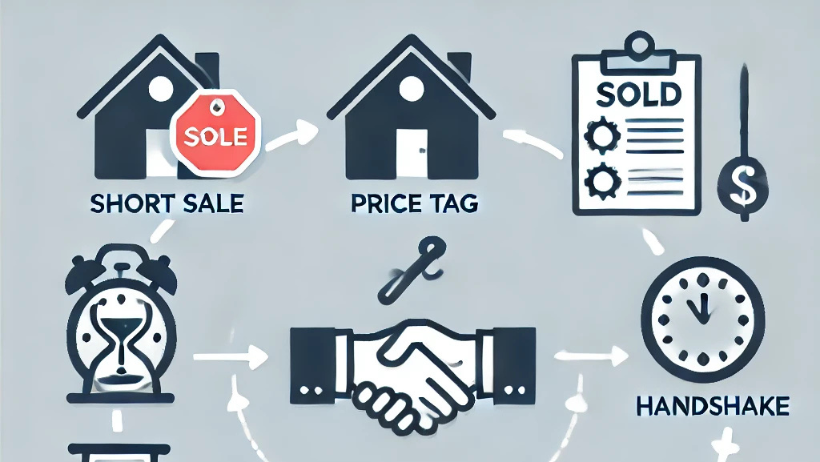If you’re struggling with mortgage payments and owe more on your home than it’s worth, a short sale might be the solution you need. The short sale process can help you avoid foreclosure and get out from under an unaffordable mortgage.
In this guide, we’ll walk you through each step of the short sale process so you can make informed decisions about your situation.

What is a short sale?
A short sale is when a homeowner sells their property for less than the remaining balance on their mortgage, with the approval of the lender. The lender agrees to accept the proceeds from the sale as a full settlement of the loan, even though it doesn’t cover the full debt. This process can help homeowners who are facing financial hardship and are at risk of foreclosure.
Step 1: Assess if a short sale is right for you
Before diving into the short sale process, it’s important to determine whether you qualify. A short sale typically makes sense if:
- Your home is underwater: This means you owe more on the mortgage than the property is currently worth.
- You’re experiencing financial hardship: Job loss, divorce, medical expenses, or other personal financial crises can make it impossible to continue making your mortgage payments.
If these conditions apply to you, a short sale may help you avoid foreclosure and relieve some of the financial burden.
Step 2: Collect necessary documents
To start the short sale process, you’ll need to provide your lender with several documents. These help the lender assess your financial hardship and determine whether to approve the short sale. The key documents include:
- Hardship letter: A letter that explains your financial situation and why you cannot afford to pay your mortgage.
- Proof of income: Recent pay stubs, tax returns, and bank statements that show your financial position.
- Mortgage statement: To show the remaining balance on your mortgage.
- Comparative market analysis (CMA) or appraisal: A report that helps the lender determine the current value of your home.
- Listing agreement: A signed agreement between you and your real estate agent to list the property for sale.
- Authorization form: A document that gives your real estate agent permission to communicate with the lender on your behalf.
Gathering these documents in advance will streamline the short sale process and make it easier for the lender to evaluate your request.
Step 3: Contact your lender
The next step in the short sale process is to notify your lender that you’re considering a short sale. You’ll need to submit all of the necessary documents, as outlined above. Some lenders have specific forms for initiating a short sale, so be sure to follow their instructions carefully.
During this stage, your lender will assess your financial situation and decide whether they’ll approve the short sale. It’s important to stay in regular contact with your lender throughout this process to ensure a smooth experience.
Step 4: Wait for lender approval
Once you’ve submitted your short sale package, the lender will review your request. The short sale process can take time, often several weeks to a few months, as the lender evaluates your financial hardship and the value of your home.
During this period, the lender might ask for additional documentation, so be prepared to provide any further information they require. Some lenders may also request an appraisal to confirm the home’s market value before approving the sale.
Step 5: List your home for sale
Once your lender has reviewed your case and given you the go-ahead, the next step is to list your home for sale. Your real estate agent will help you set an appropriate listing price, often based on the comparative market analysis (CMA) or appraisal you submitted to the lender.
It’s important to market your property effectively and work with your agent to attract buyers. Keep in mind that the lender may have a specific price range they want to see for the home, and they will need to approve any offers that come in.
Step 6: Submit offers to the lender
As offers come in for your home, your real estate agent will submit them to the lender for approval. The lender will review each offer and decide whether to accept or reject it. This is a critical part of the short sale process, as the lender must approve the sale price before it can proceed.
In some cases, the lender may counter an offer if they feel it doesn’t meet their expectations. As the seller, you’ll need to work closely with your agent to navigate these negotiations.
Step 7: Negotiate with the lender (if necessary)
Negotiation is a common part of the short sale process. If the lender doesn’t accept an initial offer, they may counter it with a higher price. In some situations, the lender may also require you to sign a promissory note to repay part of the remaining mortgage balance after the sale, known as a deficiency.
At this stage, your real estate agent will help you negotiate with the lender to ensure that you reach an agreement that works for both parties. Keep in mind that the lender is not obligated to accept any offer, so patience and flexibility are key.
Step 8: Closing the short sale
Once your lender has approved an offer, the short sale can proceed to closing. During this step, the title company and escrow agent will handle the final paperwork. You will need to vacate the property by the agreed-upon date, and the buyer will take possession after the sale is complete.
At closing, the lender will release the lien on the property, and the proceeds from the sale will go toward paying off your mortgage. If there is any remaining balance, the lender may choose to forgive it or require repayment, depending on the terms of the agreement.
Step 9: After the short sale – what happens next?
Once the short sale process is complete, there are a few things to consider:
- Credit Impact: A short sale will likely affect your credit score, though the impact is typically less severe than a foreclosure. It may remain on your credit report for up to seven years, but its effects will lessen over time.
- Tax Implications: If the lender forgives any of the debt, you may be required to pay taxes on the forgiven amount. It’s important to consult with a tax professional to understand the potential tax consequences.
- Deficiency Balance: If the lender doesn’t forgive the remaining balance, you may be required to repay the deficiency. However, some lenders may forgive this debt as part of the short sale agreement.
Conclusion
The short sale process can offer a valuable solution for homeowners in financial distress who are unable to keep up with mortgage payments. Although the process can be complex and time-consuming, it can help you avoid the damaging consequences of foreclosure and give you a fresh start.
If you’re considering a short sale, it’s important to work with an experienced real estate agent and seek guidance from legal and financial professionals to ensure that you fully understand the process and its implications.
By following these steps and staying informed, you can navigate the short sale process successfully and take the necessary steps toward a brighter financial future.
Keywords: Short sale, short sale process, how to do a short sale, short sale steps, short sale approval, real estate short sale, mortgage help, short sale guide, short sale strategy.
If you have any questions and want to learn more about the short sale process, reach out to Jennifer Yoingco, REALTOR®, and her team, The Houston Suburb Group. They’ll help you get ready to EXPERIENCE LIVING IN HOUSTON TEXAS!

Download our FREEBIES here!
The Ultimate Home Buyer’s Guide
The Ultimate Home Seller’s Guide
Find us on YouTube!
#jenniferyoingcorealtor #jenniferyoingco #JenniferYoingcoTexas #houstonsuburb #houstonsuburbs #houstonsuburbgroup #texasrelocationexperts #HoustonRelocationExpert #HoustonRelocationSpecialist #NurseRelocationExpert #NurseRelocationSpecialist #newhomeconstruction #thehighlands #ravennahomes #ravennahomesforsale #ravennahomesrealtor #ravennahomesrealestateagent #springtexas #tomballtexas #livinginhoustontexas #livinginhouston #thewoodlandstexas #conroetexas #montgomerytexas #cypresstexas #newcaneytexas #portertexas #katytexas #pearlandtexas #richmondtexas #fulsheartexas #sugarlandtexas #houstontexas #magnoliatexas #hockleytexas #pinehursttexas #jerseyvillagetexas #humbletexas

